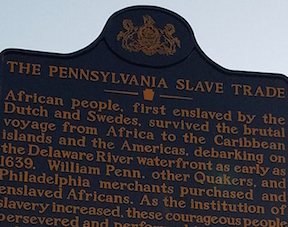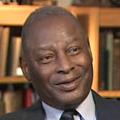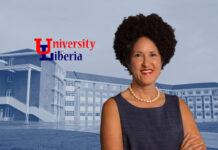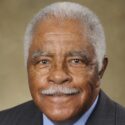 Charles L. Blockson, the curator emeritus of the Afro-American Collection at Temple University in Philadelphia, led an effort to commemorate the lives of enslaved Africans who labored in Pennsylvania or who were transported through Philadelphia on their way to southern plantations. Blockson started a petition and organized support for the erection of a memorial marker on the city’s waterfront recognizing Philadelphia history in the slave trade. The historical marker was recently dedicated in a ceremony near the city’s Independence Seaport Museum.
Charles L. Blockson, the curator emeritus of the Afro-American Collection at Temple University in Philadelphia, led an effort to commemorate the lives of enslaved Africans who labored in Pennsylvania or who were transported through Philadelphia on their way to southern plantations. Blockson started a petition and organized support for the erection of a memorial marker on the city’s waterfront recognizing Philadelphia history in the slave trade. The historical marker was recently dedicated in a ceremony near the city’s Independence Seaport Museum.
Slaves passed through Philadelphia as early as 1639. In 1780, Pennsylvania was the first state to pass a law that mandated that any child born to a slave would be free person. Yet, even as late as 1840, the U.S. Census listed about 1,000 slaves in the state.
The historical marker reads in part: “William Penn, other Quakers, and Philadelphia merchants purchased and enslaved Africans. As the institution of slavery increased, these courageous people persevered and performed integral roles in building Pennsylvania and the nation.”
 Blockson is a graduate of Pennsylvania State University and later taught history at a Philadelphia-area high school. He traveled extensively and amassed an extensive collection of books and other materials relating to African, African American, and African Caribbean history. In 1984, he donated his collection to Temple University. The collection includes slave narratives, African American sheet music, oral histories, letters and correspondence of major figures in African American history, and more than 500,000 photographs.
Blockson is a graduate of Pennsylvania State University and later taught history at a Philadelphia-area high school. He traveled extensively and amassed an extensive collection of books and other materials relating to African, African American, and African Caribbean history. In 1984, he donated his collection to Temple University. The collection includes slave narratives, African American sheet music, oral histories, letters and correspondence of major figures in African American history, and more than 500,000 photographs.












Thank you, always, Charles Blockson, for your extraordinary and dedicated work over so many decades. I happened to be at the Seaport Museum recently and saw this marker with total shock, amazement and joy that somebody (a team no doubt) had succeeded in getting Philadelphia PA to acknowledge visibly the Exploitation / enslavement on which this city and country were founded and this a small fraction of the story. Thanks to everyone for this important work. Now onto meaningful reparations. Rita 2016